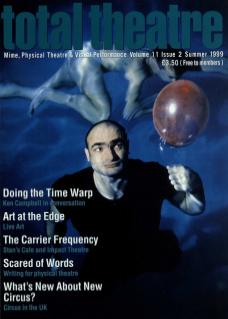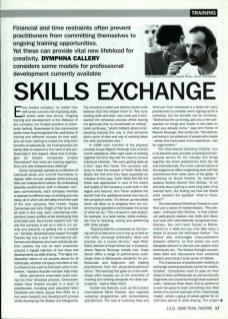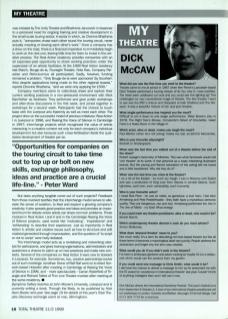Every theatre company, no matter how well tuned, runs the risk of growing stale. All artists need new stimuli. Ongoing training and development is the lifeblood of any company, but funded provision is notoriously lacking. Businesses in the commercial sector have long recognised the usefulness of training and refresher courses for their staff, and are even starting to realise the long-term benefits of sabbaticals. Yet funding bodies are barely able to respond to the need of arts professionals in this respect. What kind of strategies do theatre companies employ themselves? And what are training organisations and arts entrepreneurs offering?
Some companies operate as a collection of individual artists who commit themselves to regular, often annual, projects whilst pursuing their own independent careers. By undertaking separate performance work in between company commitments, each company member is exposed to different ways of working and new ideas; all of which will ultimately enrich the work of the core company. Paul Hunter, Hayley Carmichael and John Wright of Told by an Idiot all work in this way, each maintaining independent career profiles whilst developing their ensemble work. Paul Hunter explains that ‘the way the company is set up is vital to our survival and prevents us getting into a creative rut’. Similarly, Wolverhampton-based Foursight Theatre tap into a pool of international performers and directors who have individually distinct careers; the mix on each production ensures a regular injection of new ideas and developments via skills-sharing. ‘The highly collaborative nature of our process allows for all individuals, whether company members or not, to influence the work so that each show is distinctive,’ explains founder member Kate Hale.
Other permanent ensembles build training into their rehearsal process. Cirencester-based Kaos Theatre brought in a team of practitioners, including voice specialist Helen Chadwick and Maria Jaqusz from ENO, for a two-week research and development process whilst developing The Master and Marguerita.
The company's writer and director Xavier Leret believes that this helped them to ‘fine tune existing skills and learn new ones and it kick-started the rehearsal process whilst leaving me gloriously free to concentrate on writing’. Leret continues, ‘what's brilliant about incorporating training this way is that someone else's point of view and way of working takes the work somewhere else.’
In 1998 each member of the physical comedy troupe Rejects Revenge took a seven-month sabbatical. After eight years of working together full-time they felt the need to pursue individual interests. ‘We were getting stale as a trio,’ says Ann Farrar. The company was lucky to have the support of North West Arts Board, the first time they have supported an initiative of this type. North West Arts felt the break was appropriate in view of the extent and quality of the company's work both in the region and beyond. Ann Farrar explains the benefit that the sabbatical period has had on the company's work: ‘It's thrown up new ideas which will allow us to progress from our current touring operations and broaden the scope of what we do.’ The company's next project, for example, is a radio series, whilst individually they're directing, writing and performing with other people.
‘Opportunities for companies on the touring circuit to take time out to top up or bolt on new skills, exchange philosophy, ideas and practice are a crucial life-line,’ says Peter Ward, director of Hope Street Ltd. in Liverpool, where Rejects Revenge initially met. Hope Street offers a range of performance workshops (free to Merseyside residents) for professionals and beginners with leading practitioners from the physical/visual/mime arena. ‘The learning that goes on in the workshops often evolves out of the chemistry of meeting and working alongside the other participants,’ claims Peter Ward.
Certain key festivals, such as the London International Mime Festival, also organise workshop programmes with contemporary practitioners. The cost of workshop fees and ‘time out’ from rehearsals is a factor for many practitioners to consider when signing up for a workshop, but the benefits can be immense. ‘Workshops fire up energy, give you a new perspective on things and maybe a new take on what you already know,’ says Ann Farrar of Rejects Revenge. She continues: ‘Sometimes just being in the presence of people who inspire – artists who have years more experience – can be regenerative.’
"Opportunities for companies on the touring circuit to take time out to top up or bolt on new skills, exchange philosophy, ideas and practice are a crucial life-line." – Peter Ward
The International Workshop Festival, now in its eleventh year, provides a training and educational service for the industry and brings together the finest practitioners from the UK and internationally. The cross-cultural nature of the programme offers invigorating links with key practitioners from other parts of the globe. ‘A workshop on Butoh theatre, for example,’ explains festival director Dick McCaw, ‘is not primarily about getting a week-long taste of an oriental form, but finding out how the Butoh artist answers the question, What is movement?’
The International Workshop Festival is more than just a series of masterclasses. ‘The principle,’ enthuses Dick McCaw, ‘is that individual participants explore new skills and ideas, and work with internationally recognised practitioners. You can't learn Suzuki or Biomechanics in a week but you may take away a desire to pursue the technique further.’ The festival also encourages cross-pollination between artforms, so that actors can work alongside dancers or dancers can explore voice techniques, etc. The festival fortnight incorporates talks and discussions from workshop leaders, promoting a lively sense of debate.
The importance of practitioners meeting to exchange working practices cannot be overestimated. ‘Companies need to pass on their ideas to other professionals as well as educate beginners and students through their outreach work,’ observes Peter Ward. And no performer is ever too good to learn something new. Real Action II is a prime example of the 'interchange model', where a group of artists gather for an intensive period of skills-sharing. The project was initiated by The Unity Theatre and Bhathena-Jancovich in response to a perceived need for ongoing training and creative development in the small-scale touring sector. A sector in which, as Chenine Bhathena puts it, ‘companies chase each other round the touring circuit, never actually meeting or viewing each other's work’. Once a company has a show on the road, there is a financial imperative to immediately begin to work on the next one, leaving little time for them to invest in the creative process. The Real Action residency provides companies with an all-expenses-paid opportunity to share working practices under the supervision of an artistic facilitator. At the 1999 Real Action residency last March, Bouge-de-là, Foursight Theatre, Nola Rae, Company Paradiso and Ridiculusmus all participated. Sadly, however, funding remained a problem. ‘Only Bouge-de-là were sponsored (by Southern Arts) despite applications being made to the other regional boards,’ reports Chenine Bhathena, ‘and we were only applying for £500.’
Company members came to collectively share and explore their current working practices in a non-pressured environment with Mick Barnfather as facilitator. They performed and gave public workshops and after show discussions in the first week, and joined together in workshops for a second week. Participants had the chance to touch base with the Liverpool arts fraternity as well as meet each other. The project drew on the successful model of previous initiatives: Real Action I in Liverpool in 1996, and Raising the Voice of Silence in Cambridge in 1997; interchange projects which recognised the value of artists interacting in a creative context not only for each company's individual development but also because such cross-fertilisation feeds the qualitative development of theatre per se.
But does anything tangible come out of such projects? Feedback from those involved testifies that the interchange model serves to alleviate the sense of isolation, to feed and expand a growing company's creativity; it also spreads good practice and ideas and provides an important forum for debate where artists can share common problems. Those involved in Real Action I and II and in the Cambridge Raising the Voice of Silence projects, used words like 'motivating', 'inspirational and 'exhilarating' to describe their experience. Just as importantly in Real Action II, artistic and creative issues such as how to structure and edit material generated through improvisation, and the question of 'to script or not to script' were hotly debated.
The interchange model acts as a revitalising and networking catalyst for participants, and gives training organisations, administrators and academics a chance to catch up on new practices and make new contacts. Several of the companies on Real Action II were new to bookers in Liverpool, for example. Sometimes, too, creative partnerships evolve out of such meetings: Jonathan Stone of Ralf Ralf went on to direct Norwich-based Hoipolloi after meeting in Cambridge at Raising the Voice of Silence in 1996, and – more spectacularly – Carran Waterfield of Triangle and Richard Talbot of Thin Line Theatre married after meeting at the same residency.
Dymphna Callery teaches at John Moore's University, Liverpool and is currently writing a book, Through the Body, to be published by Nick Hern Books next year. See page 19 for details of this year's Total Theatre Discovery exchange event at mac, Birmingham.


